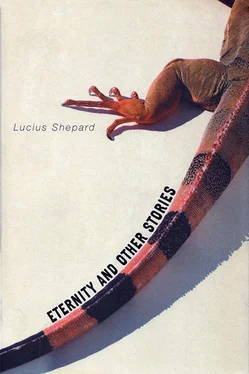Люциус Шепард - Eternity and Other Stories
Здесь есть возможность читать онлайн «Люциус Шепард - Eternity and Other Stories» весь текст электронной книги совершенно бесплатно (целиком полную версию без сокращений). В некоторых случаях можно слушать аудио, скачать через торрент в формате fb2 и присутствует краткое содержание. Город: New York, Год выпуска: 2005, ISBN: 2005, Издательство: Thunder's Mouth Press, Жанр: Фантастика и фэнтези, prose_magic, на английском языке. Описание произведения, (предисловие) а так же отзывы посетителей доступны на портале библиотеки ЛибКат.
- Название:Eternity and Other Stories
- Автор:
- Издательство:Thunder's Mouth Press
- Жанр:
- Год:2005
- Город:New York
- ISBN:978-1-560-25662-5
- Рейтинг книги:5 / 5. Голосов: 1
-
Избранное:Добавить в избранное
- Отзывы:
-
Ваша оценка:
- 100
- 1
- 2
- 3
- 4
- 5
Eternity and Other Stories: краткое содержание, описание и аннотация
Предлагаем к чтению аннотацию, описание, краткое содержание или предисловие (зависит от того, что написал сам автор книги «Eternity and Other Stories»). Если вы не нашли необходимую информацию о книге — напишите в комментариях, мы постараемся отыскать её.
“Lucius Shepard’s stories a jungles — densely alive, sometimes mysterious, often gorgeous, and always dangerous.” — Katerine Dunn, author of Geek Love
Eternity and Other Stories — читать онлайн бесплатно полную книгу (весь текст) целиком
Ниже представлен текст книги, разбитый по страницам. Система сохранения места последней прочитанной страницы, позволяет с удобством читать онлайн бесплатно книгу «Eternity and Other Stories», без необходимости каждый раз заново искать на чём Вы остановились. Поставьте закладку, и сможете в любой момент перейти на страницу, на которой закончили чтение.
Интервал:
Закладка:
And she goes, walking smartly toward the door, leaving him with no certainty of conclusion, with his half-grown erection and his instantly catalogued memory of the kiss surfacing to be examined and weighed, its tenderness and fragility to be considered, its sexual intensity to be marked upon a scale, its meaning surmised, and by the time he’s made these judgments, waking to the truth that she has truly, unequivocally gone and deciding to run after her, she’s out the door. By the time he reaches the door, shouldering it open, she’s twenty-five, thirty feet down the sidewalk, stepping quickly between the parked cars and the storefronts, passing a shadowed doorway, and he’s about to call out her name when she moves into the light spilling from a coffee shop window and he notices that her shoes are blue. Pale blue with a silky sheen, and of a shape that appears identical to that of the half shoe left on the bar. If, indeed, it was left there. He can’t remember now. Did she take it? The question has a strange, frightful value, born of a frightful suspicion that he cannot quite reject, and for a moment he’s torn between the impulse to go after her and a desire to turn back into the bar and look for the shoe. That, in the end, is what’s important. To discover if she took the shoe, and if she did, then to fathom the act, to decipher it. Was it done because she thought it a gift, or because she wanted it so badly, maybe to satisfy some freaky neurotic demand, that she felt she had to more or less steal it, get him confused with a kiss and bolt before he realized it was missing? Or—and this is the notion that’s threatening to possess him—was the shoe hers to begin with? Feeling foolish, yet not persuaded he’s a fool, he watches her step off the curb at the next corner and cross the street, dwindling and dwindling, becoming indistinct from other pedestrians. A stream of traffic blocks off his view. Still toying with the idea of chasing after her, he stands there for half a minute or so, wondering if he has misinterpreted everything about her. A cold wind coils like a scarf about his neck, and the wet pavement begins soaking into his sock through the hole in his right boot. He squints at the poorly defined distance beyond the cross-street, denies a last twinge of impulse, then yanks open the door of the Blue Lady. A gust of talk and music seems to whirl past him from within, like the ghost of a party leaving the scene, and he goes on inside, even though he knows in his heart that the shoe is gone.
Bobby’s immunity to the pit has worn off. In the morning he’s sick as last week’s salmon plate. A fever that turns his bones to glass and rots his sinuses, a cough that sinks deep into his chest and hollows him with chills. His sweat smells sour and yellow, his spit is thick as curds. For the next forty-eight hours he can think of only two things, medicine and Alicia. She’s threaded through his fever, braided around every thought like a strand of RNA, but he can’t even begin to make sense of what he thinks and feels. A couple of nights later the fever breaks. He brings blankets, a pillow, and orange juice into the living room and takes up residence on the sofa. “Feeling better, huh?” says the roommate, and Bobby says, “Yeah, little bit.” After a pause the roommate hands him the remote and seeks refuge in his room, where he spends the day playing video games. Quake , mostly. The roars of demons and chattering chain guns issue from behind his closed door.
Bobby channel surfs, settles on CNN, which is alternating between an overhead view of Ground Zero and a studio shot of an attractive brunette sitting at an anchor desk, talking to various men and women about 9/11, the war, the recovery. After listening for almost half an hour, he concludes that if this is all people hear, this gossipy, maudlin chitchat about life and death and healing, they must know nothing. The pit looks like a dingy hole with some yellow machines moving debris—there’s no sense transmitted of its profundity, of how—when you’re down in it—it seems deep and everlasting, like an ancient broken well. He goes surfing again, finds an old Jack the Ripper movie starring Michael Caine, and turns the sound low, watches detectives in long dark coats hurrying through the dimly lit streets, paperboys shouting news of the latest atrocity. He begins to put together the things Alicia told him. All of them. From “I’ve just been to a funeral,” to “Everybody’s ready to go on with their lives, but I’m not ready,” to “That’s why I come here… to figure out what’s missing,” to “I have to go.” Her transformation… did he really see it? The memory is so unreal, but then all memories are unreal, and at the moment it happened, he knew to his bones who and what she was, and that when she took the shoe, the object that let her understand what had been done to her, she was only reclaiming her property. Of course everything can be explained in other ways, and it’s tempting to accept those other explanations, to believe she was just an uptight careerwoman taking a break from corporate sanity, and once she recognized where she was, what she was doing, who she was doing it with, she grabbed a souvenir and beat it back to the email-messaging, network-building, clickety-click world of spread sheets and wheat futures and martinis with some cute guy from advertising who would eventually fuck her brains out and afterward tell the-bitch-was-begging-for-it stories about her at his gym. That’s who she was, after all, whatever her condition. An unhappy woman committed to her unhappy path, wanting more yet unable to perceive how she had boxed herself in. But the things that came out of her on their last night at the Blue Lady, the self-revelatory character of her transformation… the temptation of the ordinary is incapable of denying those memories.
It’s a full week before Bobby returns to work. He comes in late, after darkness has fallen and the lights have been switched on, halfway inclined to tell his supervisor that he’s quitting. He shows his ID and goes down into the pit, looking for Pineo and Mazurek. The great yellow earth movers are still, men are standing around in groups, and from this Bobby recognizes that a body has been recently found, a ceremony just concluded, and they’re having a break before getting on with the job. He’s hesitant to join the others, and pauses next to a wall made of huge concrete slabs, shattered and resting at angles atop one another, holding pockets of shadow and worse in their depths.
He’s been standing there about a minute when he feels her behind him. It’s not like in a horror story. No terrible cold or prickling hairs or windy voices. It’s like being with her in the bar. Her warmth, her perfumey scent, her nervous poise. But frailer, weaker, a delicate presence barely in the world. He’s afraid if he turns to look at her, it will break their tenuous connection. She’s probably not visible, anyway. No Stephen King commercial, no sight of her hovering a few inches off the ground, bearing the horrid wounds that killed her. She’s a willed fraction of herself, less tangible than a wisp of smoke, less certain than a whisper. “Alicia,” he says, and her effect intensifies. Her scent grows stronger, her warmth more insistent, and he knows why she’s here. “I realize you had to go,” he says, and then it’s like when she embraced him, all her warmth employed to draw him close. He can almost touch her firm waist, the tiered ribs, the softness of a breast, and he wishes they could go out. Just once. Not so they could sweat and make sleepy promises and lose control and then regain control and bitterly go off in opposite directions, but because at most times people are only partly there for one another—which was how he and Alicia were in the Blue Lady, knowing only the superficial about each other, a few basic lines and a hint of detail, like two sketches in the midst of an oil painting, their minds directed elsewhere, not caring enough to know all there was to know—and the way it is between them at this moment, they would try to know everything. They would try to find the things that did not exist like smoke behind their eyes. The ancient grammars of the spirit, the truths behind their old yet newly demolished truths. In the disembodiment of desire, an absolute focus born. They would call to one another, they would forget the cities and the wars… Then it’s not her mouth he feels, but the feeling he had when they were kissing, a curious mixture of bewilderment and carnality, accented this time by a quieter emotion. Satisfaction, he thinks. At having helped her understand. At himself understanding his collection of relics and why he approached her. Fate or coincidence, it’s all the same, all clear to him now.
Читать дальшеИнтервал:
Закладка:
Похожие книги на «Eternity and Other Stories»
Представляем Вашему вниманию похожие книги на «Eternity and Other Stories» списком для выбора. Мы отобрали схожую по названию и смыслу литературу в надежде предоставить читателям больше вариантов отыскать новые, интересные, ещё непрочитанные произведения.
Обсуждение, отзывы о книге «Eternity and Other Stories» и просто собственные мнения читателей. Оставьте ваши комментарии, напишите, что Вы думаете о произведении, его смысле или главных героях. Укажите что конкретно понравилось, а что нет, и почему Вы так считаете.












